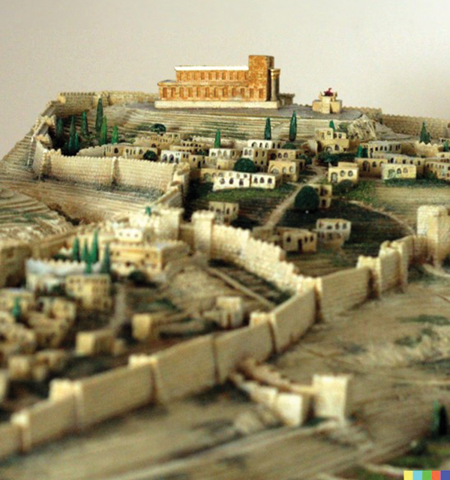“From then on, Jesus began telling His disciples what would happen to Him. He said, ‘I must go to Jerusalem. There the nation’s leaders, the chief priests, and the teachers of the Law of Moses will make me suffer terribly. I will be killed, but three days later I will rise to life.'” (Matthew 16:21 Contemporary English Version)

Four months ago, October 7, 2023, to be exact, Hamas launched a surprise missile attack on Israel. At that time, unless a person were sent to fight, re-establish peace, or extract loved ones from danger, it wasn’t likely that anyone would have said, “I have to go to Jerusalem.” Death was in the air!
About two thousand years ago, Jesus told His disciples, “I must go to Jerusalem.” Death was in the air then, also, and it was Jesus’ own death—and He knew it. Not only did He know that He would die in Jerusalem, He was also aware of the suffering he would experience and that it would come from every quarter:
• From the Palm Sunday crowd that would welcome Him with “Hosanna to the Son of David” would come shouts of “Crucify Him!”
• From His own disciples would come betrayal by Judas (this troubled Jesus’ spirit); lack of support by Peter, James, and John (too tired to watch with Jesus in the Garden of Gethsemane, they fell asleep instead); and denial by Peter (three times before the rooster crowed twice).
• From Jewish groups (the scribes, Pharisees, Sadduccess, Herodians, chief priests, and elders) would come severe opposition to Jesus and plots to kill Him.
• From the Roman governor, Pontius Pilate, would come a declaration of Jesus’ innocence. But then, for fear of the crowd, Pilate would consent to have Jesus crucified.
• From the Roman soldiers would come humiliation, torture, and crucifixion.
• From revilers gathered on Calvary would come blasphemous remarks and mockery.
• From everyone ever born would come the burden of sin (our sins included) for which He would experience God’s wrath.
• From God the Father: abandonment. Jesus would cry from the cross, “Eli, Eli, lama sabachthani?” which means, “My God, my God, why have you forsaken Me?”
Being true God, Jesus knew that all these things would happen. We’re told that in the Garden of Gethsemane “Jesus, therefore, knowing all things that should come upon Him, went forward. . . .” (John 18:4). But being true man, He was deeply distressed by the horrors that would confront Him. He prayed, in agony, that the cup of suffering might pass from Him. Remember though, His prayer to the Father ended with the words, “nevertheless, not as I will, but as You will.” (Matthew 26:39) The Way—Jesus—was not looking for a way out. He didn’t try to escape when arrested; He offered no resistance. He told Peter to put away the sword, and He, Jesus, set aside His divine power. He willingly laid down His life (John 10:18). “He was obedient to the point of death.” (Philipians 2:8)
And death did come: About the ninth hour, on the cross, Jesus said, “It is finished.” (John 19:30) His fight was over; He had crushed Satan. “That through death He might destroy him who had the power of death, that is, the devil.” (Hebrews 2:14) His work of atonement was finished. The Prince of Peace had re-established peace between God and man. There is nothing more that needs to be done by Jesus, or anyone else, to free us from the curse of sin. He has extracted His loved ones—us, everyone—from eternal death, that whoever believes in Him should not perish, but have everlasting life.
We sing with our children, “Jesus loves me this I know, for the Bible tells me so,” and realize that one of the many Bible passages that reveals Jesus’ love for us is when He says, “I must go to Jerusalem.”
Thank you, Jesus. Amen.

is a retired teacher. He lives in Kasota, Minnesota.

